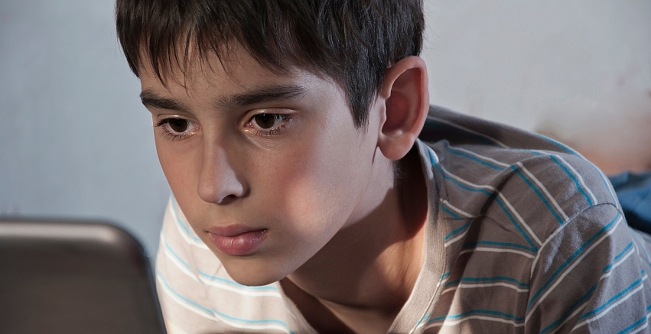Nothing worries parents more than internet porn; it regularly tops the list of parental concerns and the over-sexualised nature of modern society means kids are more at risk to its influence than ever.
If we add in the fact that teenagers are very rarely found without a smartphone, laptop or tablet in their hands, understanding the effect adult movies can have on their development and how we, as parents, can set about tackling a notoriously difficult subject with our youngsters, has almost become a necessity. This, when even bringing up the word ‘sex’ with a teenager can inspire adverse reactions including embarrassment, anger or ‘that’s gross, you’re my Dad’.
There is no doubt that some dads – in particular – remain quite blasé about porn; in most cases this is simply because they’ve had the same experiences when they were younger and don’t identify this as an unhealthy aspect of growth. Whilst women do watch adult movies, the stats unsurprisingly suggest that it is young men who form the key demographic for online sites.
What may come as a shock is that current data suggests that the average age of first exposure to internet pornography is 11 years old and that 90% of 8 – 16 year olds have viewed it online. There are at least 4.2 million porn websites and this number is growing daily, which equates to over 10% of the entire domain space and with youths more likely to form an addiction, parents need to consider the physical and psychological effect porn can have on their children.
Breaking down the effects
Plato once wrote, “The excessive increase of anything causes a reaction in the opposite direction”, a sentence which holds as true today as it did in Plato’s time. Quoting Plato might raise a few eyebrows when discussing the topic of adult movies and male sexuality, but if the shoe fits? Watching excessive internet porn has significantly contributed to a loss of sexual desire in men and the quote perfectly encapsulates this growing sexual dysfunction.
The unending stream of sexually explicit imagery, videos and text has changed the way modern young men get their ‘hit’ – which is also the biggest concern for parents. The ’hit’ refers to the overstimulation of dopamine in men’s bodies which causes sexual arousal. The release of dopamine isn’t restricted to sexual function, it primarily works as a rewarding mechanism and is released with other chemicals to alleviate a person’s mood. It’s part of the ‘reward pathway’ which helps keep a person going by rewarding them for their achievements and other day to day accomplishments.
Dopamine can be artificially released through the use of drugs and porn causes overstimulation of it. The effects of both drugs and porn are similar whereby dopamine is released without any justified action. As the internet provides an easy and accessible way to consume as much porn as possible, it negates the function of dopamine in a human body.
By having multiple ‘hits’ of dopamine, its effect lessens to a worrying extent. What occurs is that men do not find ‘normal’ sexual encounters and engagement fulfilling. In extreme cases, young men cannot achieve an erection without the excessive release of dopamine and the release only occurs when they are viewing porn that caters to their altered sexual needs.
Most men who have grown up watching porn have varying effects of this problem. In the same way drugs provide an artificial stimulation, porn has the same effect which worsens over time. The reason parents should be concerned is that giving up porn completely can be as difficult as giving up drugs. The damage porn can do to a man’s sexual ability is not fully known, but Erectile dysfunction (ED), which used to be a condition that predominantly affected older men, is now common amongst many younger men and one of the primary causes is online porn.
Further Concerns
Porn can be a problem for a number of reasons, but as parents looking to teach our children about healthy relationships, it’s the depiction of a physical encounter that can be found online that’s the real worry. The emphasis on appearance, sexual gratification with strangers, high amounts of violence, objectifying women and coercion to name just a few, are all messages we would never want taught to our children or worse, have them grow up thinking is natural.
Then there’s the promotion of sex without any contraception, which completely counteracts the ‘safe-sex’ message we would hope they follow. Many teens also have awkwardness during social interactions, an obsession with online porn is only going to make face-to-face bonding more difficult.
What can you do? Here are a few ideas:
– First of all, the days of tracking their search history are long gone, any tech-child worth their salt knows how to use incognito mode and with most having their own phone or tablet, this isn’t really an option.
– It’s still worth getting computer savvy – learn about internet controls and firewalls/adult restrictions, make these a condition of giving them a new phone/laptop and you can make sure they don’t stumble upon any dangerous sites.
– Educate your child as best you can, including how to recognise dodgy sites and explain to them why they shouldn’t be going on those.
– Talk to your teenagers! There is no better option than to have an open conversation with your child, find out what they actually think of pornography and their views may surprise you.
– Don’t avoid awkwardness – it’s best to chat to them about their concerns and not make a big deal out of anything – dads in particular can influence their sons’ views and having your child more informed on topics they might find embarrassing is never a bad thing.
– Create the model at home – nothing sets a better example than your relationship, you can show them what a real, loving and communicative partnership looks like in their own home, they will have a clearer image of what is right and wrong.








